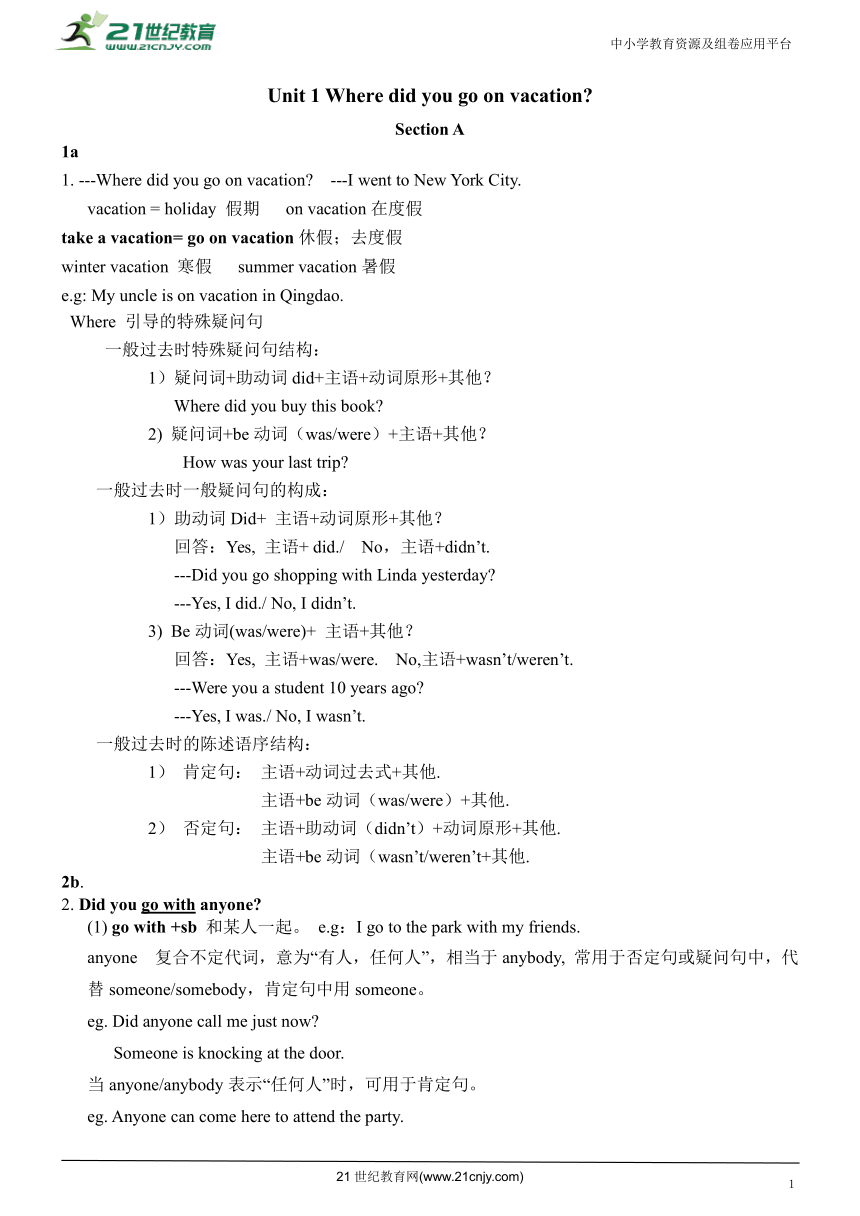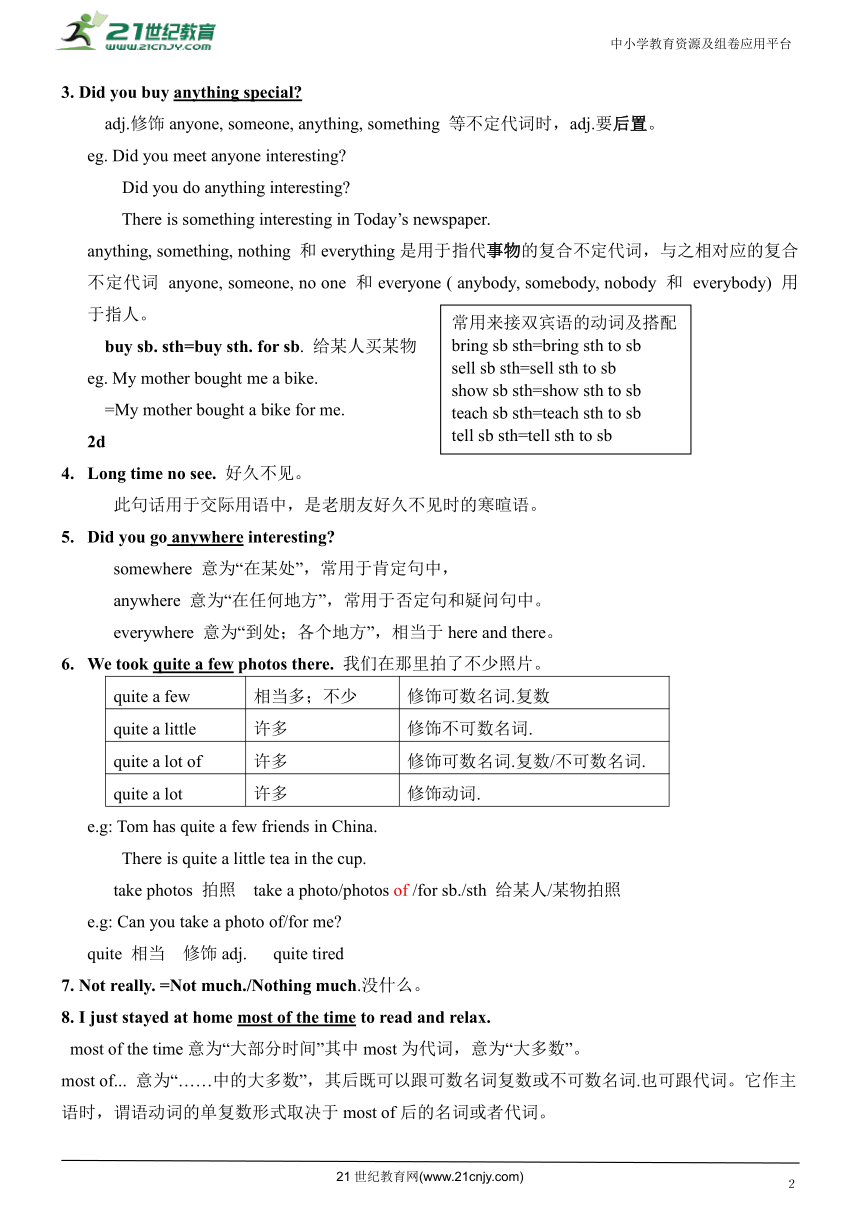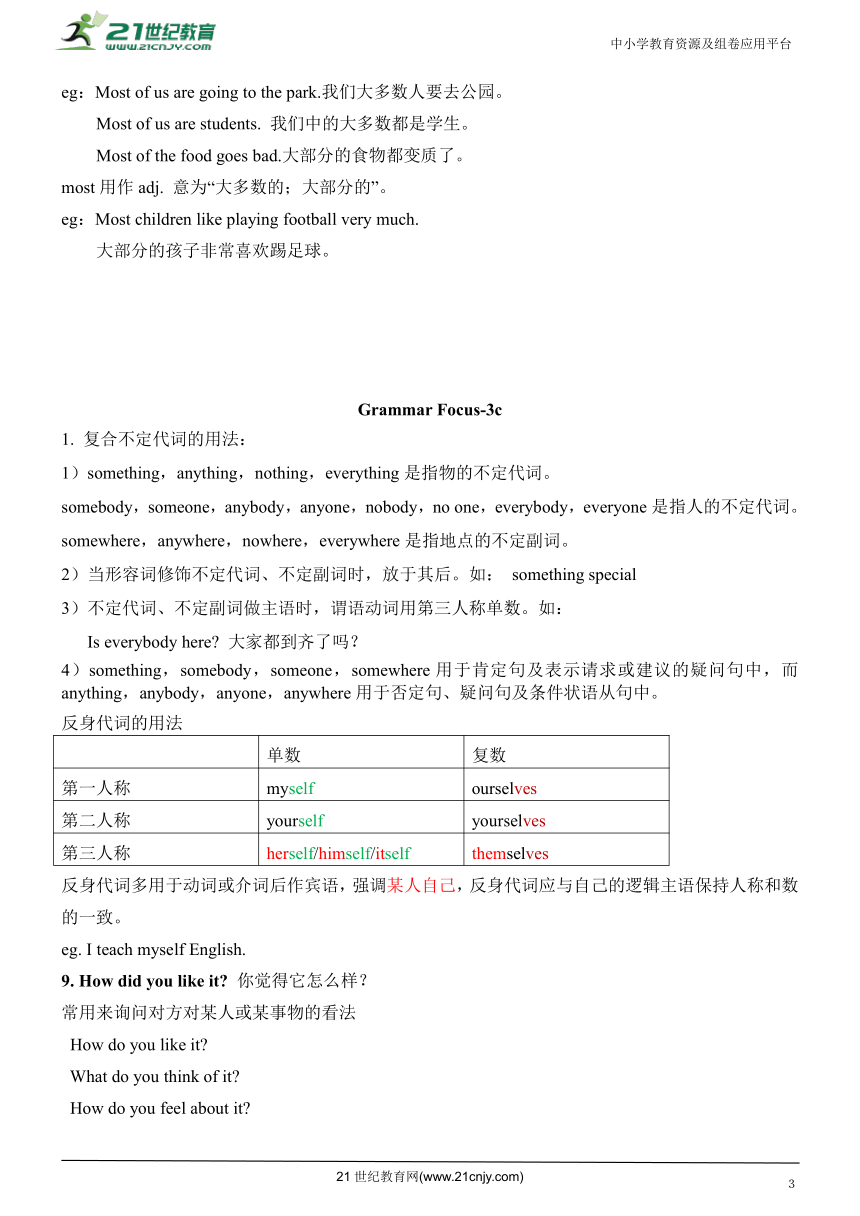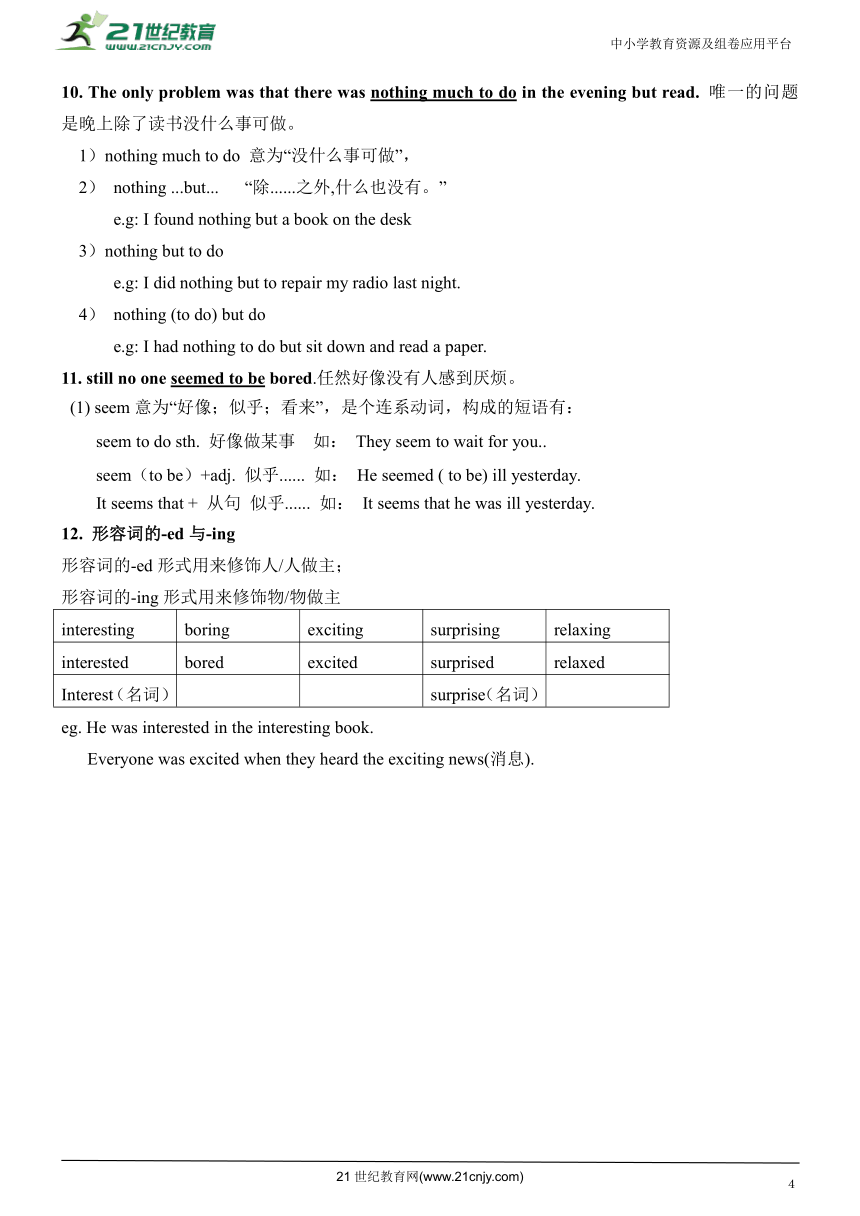Unit 1 Where did you go on vacation知识点总结归纳【人教版八年级上册】
文档属性
| 名称 | Unit 1 Where did you go on vacation知识点总结归纳【人教版八年级上册】 |  | |
| 格式 | docx | ||
| 文件大小 | 74.6KB | ||
| 资源类型 | 试卷 | ||
| 版本资源 | 人教新目标(Go for it)版 | ||
| 科目 | 英语 | ||
| 更新时间 | 2024-04-16 14:46:35 | ||
图片预览





文档简介
中小学教育资源及组卷应用平台
Unit 1 Where did you go on vacation
Section A
1a
1. ---Where did you go on vacation ---I went to New York City.
vacation = holiday 假期 on vacation在度假
take a vacation= go on vacation休假;去度假
winter vacation 寒假 summer vacation暑假
e.g: My uncle is on vacation in Qingdao.
Where 引导的特殊疑问句
一般过去时特殊疑问句结构:
1)疑问词+助动词did+主语+动词原形+其他?
Where did you buy this book
疑问词+be动词(was/were)+主语+其他?
How was your last trip
一般过去时一般疑问句的构成:
助动词Did+ 主语+动词原形+其他?
回答:Yes, 主语+ did./ No,主语+didn’t.
---Did you go shopping with Linda yesterday
---Yes, I did./ No, I didn’t.
Be动词(was/were)+ 主语+其他?
回答:Yes, 主语+was/were. No,主语+wasn’t/weren’t.
---Were you a student 10 years ago
---Yes, I was./ No, I wasn’t.
一般过去时的陈述语序结构:
肯定句: 主语+动词过去式+其他.
主语+be动词(was/were)+其他.
否定句: 主语+助动词(didn’t)+动词原形+其他.
主语+be动词(wasn’t/weren’t+其他.
2b.
2. Did you go with anyone
(1) go with +sb 和某人一起。 e.g:I go to the park with my friends.
anyone 复合不定代词,意为“有人,任何人”,相当于anybody, 常用于否定句或疑问句中,代替someone/somebody,肯定句中用someone。
eg. Did anyone call me just now
Someone is knocking at the door.
当anyone/anybody表示“任何人”时,可用于肯定句。
eg. Anyone can come here to attend the party.
3. Did you buy anything special
adj.修饰anyone, someone, anything, something 等不定代词时,adj.要后置。
eg. Did you meet anyone interesting
Did you do anything interesting
There is something interesting in Today’s newspaper.
anything, something, nothing 和everything是用于指代事物的复合不定代词,与之相对应的复合不定代词 anyone, someone, no one 和everyone ( anybody, somebody, nobody 和 everybody) 用于指人。
buy sb. sth=buy sth. for sb. 给某人买某物
eg. My mother bought me a bike.
=My mother bought a bike for me.
2d
Long time no see. 好久不见。
此句话用于交际用语中,是老朋友好久不见时的寒暄语。
Did you go anywhere interesting
somewhere 意为“在某处”,常用于肯定句中,
anywhere 意为“在任何地方”,常用于否定句和疑问句中。
everywhere 意为“到处;各个地方”,相当于here and there。
We took quite a few photos there. 我们在那里拍了不少照片。
quite a few 相当多;不少 修饰可数名词.复数
quite a little 许多 修饰不可数名词.
quite a lot of 许多 修饰可数名词.复数/不可数名词.
quite a lot 许多 修饰动词.
e.g: Tom has quite a few friends in China.
There is quite a little tea in the cup.
take photos 拍照 take a photo/photos of /for sb./sth 给某人/某物拍照
e.g: Can you take a photo of/for me
quite 相当 修饰adj. quite tired
7. Not really. =Not much./Nothing much.没什么。
8. I just stayed at home most of the time to read and relax.
most of the time意为“大部分时间”其中most为代词,意为“大多数”。
most of... 意为“……中的大多数”,其后既可以跟可数名词复数或不可数名词.也可跟代词。它作主语时,谓语动词的单复数形式取决于most of后的名词或者代词。
eg:Most of us are going to the park.我们大多数人要去公园。
Most of us are students. 我们中的大多数都是学生。
Most of the food goes bad.大部分的食物都变质了。
most用作adj. 意为“大多数的;大部分的”。
eg:Most children like playing football very much.
大部分的孩子非常喜欢踢足球。
Grammar Focus-3c
1. 复合不定代词的用法:
1)something,anything,nothing,everything是指物的不定代词。
somebody,someone,anybody,anyone,nobody,no one,everybody,everyone是指人的不定代词。
somewhere,anywhere,nowhere,everywhere是指地点的不定副词。
2)当形容词修饰不定代词、不定副词时,放于其后。如: something special
3)不定代词、不定副词做主语时,谓语动词用第三人称单数。如:
Is everybody here 大家都到齐了吗?
4)something,somebody,someone,somewhere用于肯定句及表示请求或建议的疑问句中,而anything,anybody,anyone,anywhere用于否定句、疑问句及条件状语从句中。
反身代词的用法
单数 复数
第一人称 myself ourselves
第二人称 yourself yourselves
第三人称 herself/himself/itself themselves
反身代词多用于动词或介词后作宾语,强调某人自己,反身代词应与自己的逻辑主语保持人称和数的一致。
eg. I teach myself English.
9. How did you like it 你觉得它怎么样?
常用来询问对方对某人或某事物的看法
How do you like it
What do you think of it
How do you feel about it
10. The only problem was that there was nothing much to do in the evening but read. 唯一的问题是晚上除了读书没什么事可做。
1)nothing much to do 意为“没什么事可做”,
2) nothing ...but... “除......之外,什么也没有。”
e.g: I found nothing but a book on the desk
3)nothing but to do
e.g: I did nothing but to repair my radio last night.
4) nothing (to do) but do
e.g: I had nothing to do but sit down and read a paper.
11. still no one seemed to be bored.任然好像没有人感到厌烦。
(1) seem意为“好像;似乎;看来”,是个连系动词,构成的短语有:
seem to do sth. 好像做某事 如: They seem to wait for you..
seem(to be)+adj. 似乎...... 如: He seemed ( to be) ill yesterday.
It seems that + 从句 似乎...... 如: It seems that he was ill yesterday.
12. 形容词的-ed与-ing
形容词的-ed形式用来修饰人/人做主;
形容词的-ing形式用来修饰物/物做主
interesting boring exciting surprising relaxing
interested bored excited surprised relaxed
Interest(名词) surprise(名词)
eg. He was interested in the interesting book.
Everyone was excited when they heard the exciting news(消息).
Section B
1d
say about 发表对......的看法
e.g: What did she say about the story.
2a
enjoyable 有乐趣的;令人愉快的
enjoy 喜欢;享受 enjoy doing sth.喜欢做某事
enjoy oneself=have fun=have a good time
2b
1. I arrived in Penang in Malaysia this morning with my family.
三到达
arrive in 表示到达较大的地方 eg: We arrived in Beijing yesterday.
arrive at 表示到达较小的地方 eg: We arrived at the train station.
get to eg. We get to the school at 7:00.
reach eg. I reach the school.
get to/reach/arrive 都是“到达“的意思
get to+地点=reach+地点= arrive at+地点(小)=arrive in+地点(大)
注意:若他们后面要加地点副词here, there, home等,则不需要加介词。
So we decided to go to the beach near our hotel.
decide的用法
decide to do sth. 决定做某事 eg. I decide to study hard this term(学期).
decide not to do sth. 决定不做某事
eg. I decide not to go shopping this afternoon.
decide的名词形式decision
make a decision 做决定
make a decision to do sth=decide to do sth. 决定做某事
eg: He made a decision to work hard=He decided to work hard.
decide on 决定
eg. We decided on carrying out the plan. (carry out 进行,执行,实行)
My sister and I tried paragliding.
try的用法 try---tried(过去式)
(动词) 尝试 try to do sth. 尽力/设法做某事 eg. He tried to study hard.
try doing sth. 尝试做某事 eg. I try riding my bike.
(名词) 尝试 have a try 试一试
try one’s best to do sth 尽某人最大努力做某事
eg. I try my best to learn English well.
I felt like I was a bird.
feel like 感觉像,其后常接名词或从句
eg. I felt like I was a bird.(从句)
I feel like a fish in the sea.(名词.)
想要做某事 feel like doing sth.=want to do sth.=would like to do sth.
eg. I feel like taking a walk after dinner.
I would like to eat out tonight.
ride a bike/bicycle=ride bikes/bicycles
许多的表达方式
many/lots of/a lot of/quite a few/a number of
build (动词)建造 其过去式是built
building(名词)建筑物 many buildings
I wonder what life was like here in the past.
wonder(动词)想知道=want to know 其后跟宾语从句,宾语从句用陈述语序:
Wonder+what/who/why/how...(想知道...)
eg. I wonder what he looks like.
I wonder what was like here in the past(过去)
The teacher wondered why she was late..
(2)wonderful (形容词) 精彩的;绝妙的
walk around 四处走走
What a differences a day makes!
感叹句的用法
What+a/an+adj.+可数名词单数+(主语+谓语)!
eg. What a beautiful girl (she is)!
What+adj.+可数名词.复数/不可数名词.+(主语+谓语)!
eg. What handsome boys (they are)!
What fine weather (it is)!
How+形容词./副词.+(主语+谓语)!
eg. How fine (the weather is)!
How tall (the boy is)!
How+adj.+a/an+ 可数名词单数.+(主语+谓语)
eg:How beautiful a girl she is.
(2) difference (名词). 不同之处
different (形容词) 不同的
be different from 和...不同 be the same as 和...一样
differently (副词) 不同地
But then it started raining a little so we decided to take the train.
(1) start doing sth.=start to do sth.(begin to do sth.)
eg. He started doing his homework after dinner.
(2) a little 的用法
1) 有点儿=kind of eg. She is kind of/a little silly.
2)一点儿 修饰不可数名词. eg. There is a little water in the bottle.
3)一点儿 修饰动词. eg. I can draw a little.
We waited over an hour for the train because there were too many people.
1)wait的用法 不及物动词. 必须与介词for连用 wait for sb./sth.
can’t wait to do sth. 迫不及待做某事
2) over=more than 多于
3) too many/too much/much too
too many 太多 修饰可数n.复数
too much 太多 修饰不可数n./v
much too 太 修饰adj./adv.
eg. too many people too much homework talk too much much too expensive
13. Because of the bad weather, we couldn't see anything below.
1) because of 与because
because of 介词短语 后跟n./pron./v-ing
because 连词 后跟句子
eg. Because of the heavy rain/the bad weather, we had to stay at home.
I didn’t buy the bicycle, because it was too expensive.
because of + 短语 I had to move because of my job.
because + 句子 I do it because I like it.
14. my father didn't bring enough money, so we only had one bowl of rice and some fish.
1)bring与take
bring 带来;拿来 从别处带到说话者所在地
take 带走;拿走 从说话者所在地带到别处
bring/take sb./sth. to +地点名词
eg. His father takes him to school this morning.
Please bring me my key.
Bob picked some apples and took them home.
2) enough的用法
enough +名词 如:enough umbrellas
enough 形容词/副词+enough 如:wet/quietly enough
(形/副)+enough+ to do sth. 足够…去做…
enough+ (名)+ to do sth. 足够…去做…
eg: I have enough money to go to Beijing. 我有足够的钱去北京。
She is not old enough to go to school. 她年龄不够,不能去上学。
如此...以至于 such+名短+ that 从句:She is such a popular girl that...
so+形/副+that 从句:She is so popular that everyone likes her.
2d
15 .The next day was not as good. 第二天却没有这么好了。
16. because we forget to bring an umbrella.
forget的用法
1) forget to do sth. 忘记去做某事(事情还没做)
eg. When you left the classroom, don’t forget to close the door.
2) forget doing sth. 忘记做过某事(事情已经做过了)
eg. I forget closing the window.
2e
17. along the way 沿途
18. one hour later=after one hour 一个小时以后
19. another+数词+n.=数词+more+n. 再;又
eg. another two hours=two more hours
(Self Check 2)
20. Everyone in our class took a bag with some food and water.(介词短语作后置定语) with 带有
21 look for/find out/find
look for 寻找 强调寻找的过程,但是不一定能找到
find out 查明,找出 经过一番努力最终找到
find 找到,发现 强调结果
22 My legs were so tired that I wanted to stop.
so...that 如此...以至于
eg. He is so smart that he ca年 answer my questions.
23 tell sb. to do sth. 告诉某人做某事
tell sb. not to do sth. 告诉某人不要做某事
24. keep doing sth.=go on doing sth. 继续做某事
eg. My classmates told me to keep going, so I went on.
25. jump up and down 上蹿下跳
3c
Write a travel diary like Jane’s on page. Use your notes in 3b.
Thursday, August 1st
Today I went to the Palace Museum. It was cool. Then I walked along Chang'an Street till Tian'an Men Square. The square was very big. There were many people there.
I took some photos. Then I went to a Beijing hutong. It was very old but very interesting. In the afternoon, I went to the Great Wall. The Great Wall was fantastic, so I took lots of photos there. But it was very tiring to climb the wall, so I felt very tired. After I came back to my hotel I decided go to bed early.
如何写游记
【话题分析】本单元的主要话题是节日与假期,与本单元相关的写作题目可以与节假日里的旅游相结合。命题内容以游览为主,根据提示记叙节假日里旅游的大致情况。写作时应注意游记的内容、格式以及时态的运用。
1. 内容一般从以下几个方面着手:
1) Where did you go 2) How was the weather
3) What did you do 4) How was the food
5) How were the people 6) How did you feel about the trip
2. 时态以一般过去时为主。
【写作实例】
假如你是林涛,去年夏天去北京度假,游览过很多地方。请以 My vacation to Beijing为题,写一篇80词左右的游记。内容包括:
1. 旅游景点(the Great Wall, the Palace Museum, Tian’anmen Square, a Beijing hutong, Beihai Park)
2. 天气和活动
3. 感受…
【思路点拨】
步骤 构思 列纲
1 开篇点题:我和我爸爸去北京度假了 Last summer, I went to Beijing… with my father.
2 旅游经历:介绍我们游览的地方 Visited the Great Wall… the Palace Museum… Tian’anmen Square… took photos … other interesting places
3 所感所思:玩得高兴,期待下一次再去游览 We had a great time… hope to go there again
My vacation to Beijing
Last summer, I went to Beijing on vacation with my father. It was sunny and hot.
First we visited the Great Wall. It is really the longest wall in the world. There were a lot of people there. The next day, we visited the Palace Museum and Tian’anmen Square. We took many photos there. We also visited some other interesting places in Beijing such as Beijing hutong and Beihai Park.
We had a great time in Beijing. I hope to go there again.
用with sb 结构表示伴随的情况,表示“和某人一起”
用first… the next day… we also 表示旅游的顺序
用such as 进行举例
用 I hope 表达自己的愿望
21世纪教育网(www.21cnjy.com)
Unit 1 Where did you go on vacation
Section A
1a
1. ---Where did you go on vacation ---I went to New York City.
vacation = holiday 假期 on vacation在度假
take a vacation= go on vacation休假;去度假
winter vacation 寒假 summer vacation暑假
e.g: My uncle is on vacation in Qingdao.
Where 引导的特殊疑问句
一般过去时特殊疑问句结构:
1)疑问词+助动词did+主语+动词原形+其他?
Where did you buy this book
疑问词+be动词(was/were)+主语+其他?
How was your last trip
一般过去时一般疑问句的构成:
助动词Did+ 主语+动词原形+其他?
回答:Yes, 主语+ did./ No,主语+didn’t.
---Did you go shopping with Linda yesterday
---Yes, I did./ No, I didn’t.
Be动词(was/were)+ 主语+其他?
回答:Yes, 主语+was/were. No,主语+wasn’t/weren’t.
---Were you a student 10 years ago
---Yes, I was./ No, I wasn’t.
一般过去时的陈述语序结构:
肯定句: 主语+动词过去式+其他.
主语+be动词(was/were)+其他.
否定句: 主语+助动词(didn’t)+动词原形+其他.
主语+be动词(wasn’t/weren’t+其他.
2b.
2. Did you go with anyone
(1) go with +sb 和某人一起。 e.g:I go to the park with my friends.
anyone 复合不定代词,意为“有人,任何人”,相当于anybody, 常用于否定句或疑问句中,代替someone/somebody,肯定句中用someone。
eg. Did anyone call me just now
Someone is knocking at the door.
当anyone/anybody表示“任何人”时,可用于肯定句。
eg. Anyone can come here to attend the party.
3. Did you buy anything special
adj.修饰anyone, someone, anything, something 等不定代词时,adj.要后置。
eg. Did you meet anyone interesting
Did you do anything interesting
There is something interesting in Today’s newspaper.
anything, something, nothing 和everything是用于指代事物的复合不定代词,与之相对应的复合不定代词 anyone, someone, no one 和everyone ( anybody, somebody, nobody 和 everybody) 用于指人。
buy sb. sth=buy sth. for sb. 给某人买某物
eg. My mother bought me a bike.
=My mother bought a bike for me.
2d
Long time no see. 好久不见。
此句话用于交际用语中,是老朋友好久不见时的寒暄语。
Did you go anywhere interesting
somewhere 意为“在某处”,常用于肯定句中,
anywhere 意为“在任何地方”,常用于否定句和疑问句中。
everywhere 意为“到处;各个地方”,相当于here and there。
We took quite a few photos there. 我们在那里拍了不少照片。
quite a few 相当多;不少 修饰可数名词.复数
quite a little 许多 修饰不可数名词.
quite a lot of 许多 修饰可数名词.复数/不可数名词.
quite a lot 许多 修饰动词.
e.g: Tom has quite a few friends in China.
There is quite a little tea in the cup.
take photos 拍照 take a photo/photos of /for sb./sth 给某人/某物拍照
e.g: Can you take a photo of/for me
quite 相当 修饰adj. quite tired
7. Not really. =Not much./Nothing much.没什么。
8. I just stayed at home most of the time to read and relax.
most of the time意为“大部分时间”其中most为代词,意为“大多数”。
most of... 意为“……中的大多数”,其后既可以跟可数名词复数或不可数名词.也可跟代词。它作主语时,谓语动词的单复数形式取决于most of后的名词或者代词。
eg:Most of us are going to the park.我们大多数人要去公园。
Most of us are students. 我们中的大多数都是学生。
Most of the food goes bad.大部分的食物都变质了。
most用作adj. 意为“大多数的;大部分的”。
eg:Most children like playing football very much.
大部分的孩子非常喜欢踢足球。
Grammar Focus-3c
1. 复合不定代词的用法:
1)something,anything,nothing,everything是指物的不定代词。
somebody,someone,anybody,anyone,nobody,no one,everybody,everyone是指人的不定代词。
somewhere,anywhere,nowhere,everywhere是指地点的不定副词。
2)当形容词修饰不定代词、不定副词时,放于其后。如: something special
3)不定代词、不定副词做主语时,谓语动词用第三人称单数。如:
Is everybody here 大家都到齐了吗?
4)something,somebody,someone,somewhere用于肯定句及表示请求或建议的疑问句中,而anything,anybody,anyone,anywhere用于否定句、疑问句及条件状语从句中。
反身代词的用法
单数 复数
第一人称 myself ourselves
第二人称 yourself yourselves
第三人称 herself/himself/itself themselves
反身代词多用于动词或介词后作宾语,强调某人自己,反身代词应与自己的逻辑主语保持人称和数的一致。
eg. I teach myself English.
9. How did you like it 你觉得它怎么样?
常用来询问对方对某人或某事物的看法
How do you like it
What do you think of it
How do you feel about it
10. The only problem was that there was nothing much to do in the evening but read. 唯一的问题是晚上除了读书没什么事可做。
1)nothing much to do 意为“没什么事可做”,
2) nothing ...but... “除......之外,什么也没有。”
e.g: I found nothing but a book on the desk
3)nothing but to do
e.g: I did nothing but to repair my radio last night.
4) nothing (to do) but do
e.g: I had nothing to do but sit down and read a paper.
11. still no one seemed to be bored.任然好像没有人感到厌烦。
(1) seem意为“好像;似乎;看来”,是个连系动词,构成的短语有:
seem to do sth. 好像做某事 如: They seem to wait for you..
seem(to be)+adj. 似乎...... 如: He seemed ( to be) ill yesterday.
It seems that + 从句 似乎...... 如: It seems that he was ill yesterday.
12. 形容词的-ed与-ing
形容词的-ed形式用来修饰人/人做主;
形容词的-ing形式用来修饰物/物做主
interesting boring exciting surprising relaxing
interested bored excited surprised relaxed
Interest(名词) surprise(名词)
eg. He was interested in the interesting book.
Everyone was excited when they heard the exciting news(消息).
Section B
1d
say about 发表对......的看法
e.g: What did she say about the story.
2a
enjoyable 有乐趣的;令人愉快的
enjoy 喜欢;享受 enjoy doing sth.喜欢做某事
enjoy oneself=have fun=have a good time
2b
1. I arrived in Penang in Malaysia this morning with my family.
三到达
arrive in 表示到达较大的地方 eg: We arrived in Beijing yesterday.
arrive at 表示到达较小的地方 eg: We arrived at the train station.
get to eg. We get to the school at 7:00.
reach eg. I reach the school.
get to/reach/arrive 都是“到达“的意思
get to+地点=reach+地点= arrive at+地点(小)=arrive in+地点(大)
注意:若他们后面要加地点副词here, there, home等,则不需要加介词。
So we decided to go to the beach near our hotel.
decide的用法
decide to do sth. 决定做某事 eg. I decide to study hard this term(学期).
decide not to do sth. 决定不做某事
eg. I decide not to go shopping this afternoon.
decide的名词形式decision
make a decision 做决定
make a decision to do sth=decide to do sth. 决定做某事
eg: He made a decision to work hard=He decided to work hard.
decide on 决定
eg. We decided on carrying out the plan. (carry out 进行,执行,实行)
My sister and I tried paragliding.
try的用法 try---tried(过去式)
(动词) 尝试 try to do sth. 尽力/设法做某事 eg. He tried to study hard.
try doing sth. 尝试做某事 eg. I try riding my bike.
(名词) 尝试 have a try 试一试
try one’s best to do sth 尽某人最大努力做某事
eg. I try my best to learn English well.
I felt like I was a bird.
feel like 感觉像,其后常接名词或从句
eg. I felt like I was a bird.(从句)
I feel like a fish in the sea.(名词.)
想要做某事 feel like doing sth.=want to do sth.=would like to do sth.
eg. I feel like taking a walk after dinner.
I would like to eat out tonight.
ride a bike/bicycle=ride bikes/bicycles
许多的表达方式
many/lots of/a lot of/quite a few/a number of
build (动词)建造 其过去式是built
building(名词)建筑物 many buildings
I wonder what life was like here in the past.
wonder(动词)想知道=want to know 其后跟宾语从句,宾语从句用陈述语序:
Wonder+what/who/why/how...(想知道...)
eg. I wonder what he looks like.
I wonder what was like here in the past(过去)
The teacher wondered why she was late..
(2)wonderful (形容词) 精彩的;绝妙的
walk around 四处走走
What a differences a day makes!
感叹句的用法
What+a/an+adj.+可数名词单数+(主语+谓语)!
eg. What a beautiful girl (she is)!
What+adj.+可数名词.复数/不可数名词.+(主语+谓语)!
eg. What handsome boys (they are)!
What fine weather (it is)!
How+形容词./副词.+(主语+谓语)!
eg. How fine (the weather is)!
How tall (the boy is)!
How+adj.+a/an+ 可数名词单数.+(主语+谓语)
eg:How beautiful a girl she is.
(2) difference (名词). 不同之处
different (形容词) 不同的
be different from 和...不同 be the same as 和...一样
differently (副词) 不同地
But then it started raining a little so we decided to take the train.
(1) start doing sth.=start to do sth.(begin to do sth.)
eg. He started doing his homework after dinner.
(2) a little 的用法
1) 有点儿=kind of eg. She is kind of/a little silly.
2)一点儿 修饰不可数名词. eg. There is a little water in the bottle.
3)一点儿 修饰动词. eg. I can draw a little.
We waited over an hour for the train because there were too many people.
1)wait的用法 不及物动词. 必须与介词for连用 wait for sb./sth.
can’t wait to do sth. 迫不及待做某事
2) over=more than 多于
3) too many/too much/much too
too many 太多 修饰可数n.复数
too much 太多 修饰不可数n./v
much too 太 修饰adj./adv.
eg. too many people too much homework talk too much much too expensive
13. Because of the bad weather, we couldn't see anything below.
1) because of 与because
because of 介词短语 后跟n./pron./v-ing
because 连词 后跟句子
eg. Because of the heavy rain/the bad weather, we had to stay at home.
I didn’t buy the bicycle, because it was too expensive.
because of + 短语 I had to move because of my job.
because + 句子 I do it because I like it.
14. my father didn't bring enough money, so we only had one bowl of rice and some fish.
1)bring与take
bring 带来;拿来 从别处带到说话者所在地
take 带走;拿走 从说话者所在地带到别处
bring/take sb./sth. to +地点名词
eg. His father takes him to school this morning.
Please bring me my key.
Bob picked some apples and took them home.
2) enough的用法
enough +名词 如:enough umbrellas
enough 形容词/副词+enough 如:wet/quietly enough
(形/副)+enough+ to do sth. 足够…去做…
enough+ (名)+ to do sth. 足够…去做…
eg: I have enough money to go to Beijing. 我有足够的钱去北京。
She is not old enough to go to school. 她年龄不够,不能去上学。
如此...以至于 such+名短+ that 从句:She is such a popular girl that...
so+形/副+that 从句:She is so popular that everyone likes her.
2d
15 .The next day was not as good. 第二天却没有这么好了。
16. because we forget to bring an umbrella.
forget的用法
1) forget to do sth. 忘记去做某事(事情还没做)
eg. When you left the classroom, don’t forget to close the door.
2) forget doing sth. 忘记做过某事(事情已经做过了)
eg. I forget closing the window.
2e
17. along the way 沿途
18. one hour later=after one hour 一个小时以后
19. another+数词+n.=数词+more+n. 再;又
eg. another two hours=two more hours
(Self Check 2)
20. Everyone in our class took a bag with some food and water.(介词短语作后置定语) with 带有
21 look for/find out/find
look for 寻找 强调寻找的过程,但是不一定能找到
find out 查明,找出 经过一番努力最终找到
find 找到,发现 强调结果
22 My legs were so tired that I wanted to stop.
so...that 如此...以至于
eg. He is so smart that he ca年 answer my questions.
23 tell sb. to do sth. 告诉某人做某事
tell sb. not to do sth. 告诉某人不要做某事
24. keep doing sth.=go on doing sth. 继续做某事
eg. My classmates told me to keep going, so I went on.
25. jump up and down 上蹿下跳
3c
Write a travel diary like Jane’s on page. Use your notes in 3b.
Thursday, August 1st
Today I went to the Palace Museum. It was cool. Then I walked along Chang'an Street till Tian'an Men Square. The square was very big. There were many people there.
I took some photos. Then I went to a Beijing hutong. It was very old but very interesting. In the afternoon, I went to the Great Wall. The Great Wall was fantastic, so I took lots of photos there. But it was very tiring to climb the wall, so I felt very tired. After I came back to my hotel I decided go to bed early.
如何写游记
【话题分析】本单元的主要话题是节日与假期,与本单元相关的写作题目可以与节假日里的旅游相结合。命题内容以游览为主,根据提示记叙节假日里旅游的大致情况。写作时应注意游记的内容、格式以及时态的运用。
1. 内容一般从以下几个方面着手:
1) Where did you go 2) How was the weather
3) What did you do 4) How was the food
5) How were the people 6) How did you feel about the trip
2. 时态以一般过去时为主。
【写作实例】
假如你是林涛,去年夏天去北京度假,游览过很多地方。请以 My vacation to Beijing为题,写一篇80词左右的游记。内容包括:
1. 旅游景点(the Great Wall, the Palace Museum, Tian’anmen Square, a Beijing hutong, Beihai Park)
2. 天气和活动
3. 感受…
【思路点拨】
步骤 构思 列纲
1 开篇点题:我和我爸爸去北京度假了 Last summer, I went to Beijing… with my father.
2 旅游经历:介绍我们游览的地方 Visited the Great Wall… the Palace Museum… Tian’anmen Square… took photos … other interesting places
3 所感所思:玩得高兴,期待下一次再去游览 We had a great time… hope to go there again
My vacation to Beijing
Last summer, I went to Beijing on vacation with my father. It was sunny and hot.
First we visited the Great Wall. It is really the longest wall in the world. There were a lot of people there. The next day, we visited the Palace Museum and Tian’anmen Square. We took many photos there. We also visited some other interesting places in Beijing such as Beijing hutong and Beihai Park.
We had a great time in Beijing. I hope to go there again.
用with sb 结构表示伴随的情况,表示“和某人一起”
用first… the next day… we also 表示旅游的顺序
用such as 进行举例
用 I hope 表达自己的愿望
21世纪教育网(www.21cnjy.com)
同课章节目录
- Unit 1 Where did you go on vacation?
- Section A
- Section B
- Unit 2 How often do you exercise?
- Section A
- Section B
- Unit 3 I'm more outgoing than my sister.
- Section A
- Section B
- Unit 4 What's the best movie theater?
- Section A
- Section B
- Unit 5 Do you want to watch a game show?
- Section A
- Section B
- Unit 6 I'm going to study computer science.
- Section A
- Section B
- Unit 7 Will people have robots?
- Section A
- Section B
- Unit 8 How do you make a banana milk shake?
- Section A
- Section B
- Unit 9 Can you come to my party?
- Section A
- Section B
- Unit 10 If you go to the party, you'll have a grea
- Section A
- Section B
